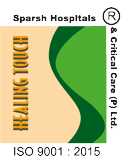Why choose Sparsh Hospitals for Medical Treatment?

The Department of Medicine at Sparsh Hospitals offers comprehensive healthcare services for the prevention, diagnosis, and treatment of a wide range of medical conditions. Our team of experienced physicians, specialists, and nurses work collaboratively to provide personalized care for each patient. With advanced diagnostic facilities and a patient-centric approach, we are committed to delivering the highest quality of care to improve health outcomes and enhance the well-being of our patients.
What is General Medicine?
General medicine, also known as internal medicine, focuses on the prevention, diagnosis, and non-surgical treatment of diseases in adults. Internists, or physicians specializing in internal medicine, manage a variety of conditions including chronic illnesses, infectious diseases, and complex medical disorders. They provide comprehensive care and coordinate with other specialists to ensure holistic management of patients’ health.

Common Medical Conditions and Treatments
– Hypertension: High blood pressure managed through lifestyle modifications, medication, and regular monitoring.
– Diabetes: Blood sugar control with medication, insulin therapy, diet, and exercise.
– Infectious Diseases: Diagnosis and treatment of infections such as flu, pneumonia, and tuberculosis with antibiotics and antiviral medications.
– Cardiovascular Diseases: Management of heart conditions like coronary artery disease, heart failure, and arrhythmias with medication, lifestyle changes, and interventional procedures.
– Gastrointestinal Disorders: Treatment of conditions like gastritis, irritable bowel syndrome (IBS), and liver diseases with medication and dietary adjustments.
– Respiratory Conditions: Management of asthma, COPD, and other respiratory disorders with inhalers, medication, and pulmonary rehabilitation.
Diagnostic Tests in General Medicine
– Blood Tests: Assess overall health and diagnose conditions like anemia, infections, and metabolic disorders.
– Imaging Studies: X-rays, CT scans, and MRIs to visualize internal organs and diagnose various conditions.
– Electrocardiogram (ECG): Measures the electrical activity of the heart to detect abnormalities.
– Endoscopy: Visual examination of the gastrointestinal tract to diagnose and treat conditions like ulcers and polyps.
– Ultrasound: Uses sound waves to create images of internal organs and diagnose conditions like gallstones and kidney stones.
Medical Treatments
– Medication Management: Prescribing and managing medications to treat and control various medical conditions.
– Preventive Care: Regular health check-ups, vaccinations, and screening tests to detect and prevent diseases early.
– Chronic Disease Management: Comprehensive care plans to manage chronic conditions like diabetes, hypertension, and heart disease.
– Lifestyle Counseling: Guidance on diet, exercise, and healthy living to promote overall well-being.
– Patient Education: Informing patients about their conditions, treatment options, and self-care strategies to empower them to take charge of their health.

